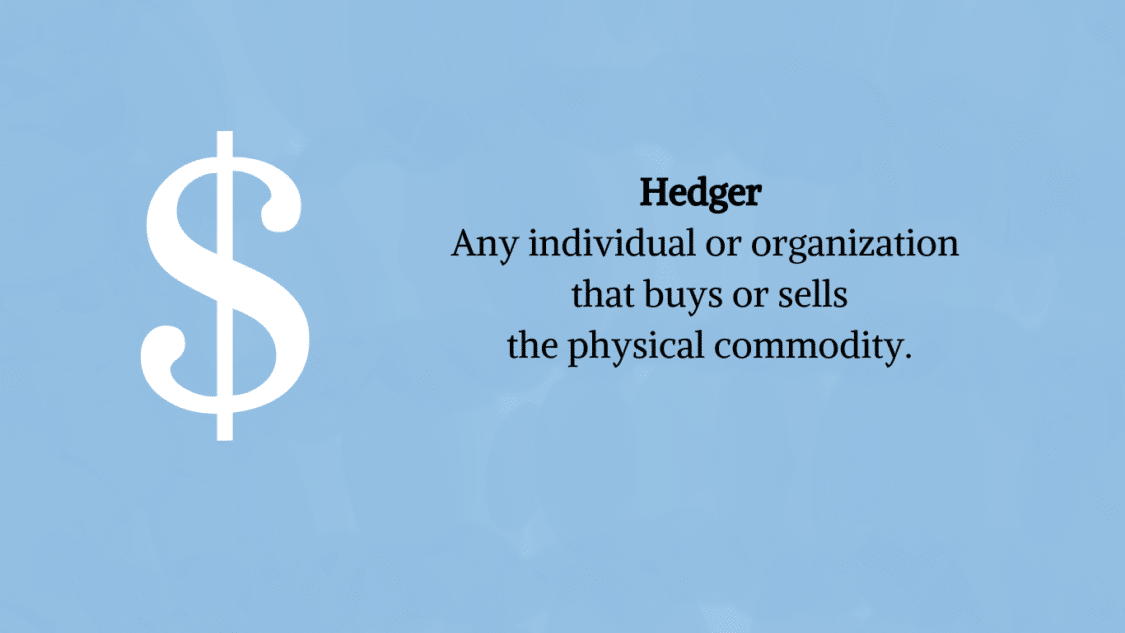Hedgers are important players in the commodities futures market, using futures contracts as a risk management strategy to protect against price volatility. These market players, which consist of producers, consumers, and enterprises with underlying commodity exposure, use hedging tactics to reduce price risks associated with their operations. They seek to stabilize their cash flow, safeguard profit margins, and gain confidence in an unstable market by locking in future pricing through futures contracts.
Understanding the goal of hedgers in commodity futures is essential for comprehending the dynamics of the commodity futures market and the overall management of price risk. Here we will explore the objectives of hedgers, the strategies implemented and their significance in finance.
Why are hedgers and speculators important in futures?

Hedgers and speculators play significant roles in the futures market, contributing to its liquidity, price discovery, and overall successful functioning. Here are some reasons why we view them as essential:
- Hedgers and Price Risk Management: Hedgers, including commodity producers and consumers, utilize futures contracts to manage and minimize price risks connected with their business. By participating in futures contracts, hedgers may lock in prices for future delivery, providing a predictable income stream or cost for their commodities. This allows them to manage their income, safeguard their profit margins, and plan their operations more precisely.
- Market Liquidity: Speculators supply liquidity to the futures market by actively trading. Their presence guarantees enough buyers and sellers actively participating in the market, allowing for efficient price discovery and easy transaction execution. Liquidity improves market efficiency and decreases the impact of big trades on pricing, benefiting all market players.
- Price Discovery: The partnership between hedgers and speculators assists in price discovery throughout the market. With their underlying commodity exposure, Hedgers give vital information on supply and demand dynamics. On the other hand, speculators provide their market knowledge and expectations, contributing to the construction of market prices based on their trading activity. The interaction between the two contributes to establishing fair and transparent commodity pricing.
- Risk Transfer: Futures contracts allow hedgers to transfer risk to speculators. Hedgers may distribute their pricing risks to speculators prepared to take the risk in return for possible rewards. This risk transfer mechanism allows hedgers to concentrate on their primary business while allowing speculators to profit from price swings depending on their market beliefs.
- Market Efficiency: The two actively enhance market efficiency by narrowing bid-ask gaps and lowering transaction costs. Hedgers contribute to market stability by using futures contracts to control their price risks, whilst speculators offer liquidity and improve price discovery. The combined effect of elements promotes a more efficient and transparent financial system.
Types of Hedgers:

Producers: Primary hedgers in the commodity futures market include farmers, mining firms, and oil producers. They utilize futures contracts to protect themselves against potential price drops in their produce. Producers may secure a lower level of revenue and protect themselves from negative price swings by locking in pricing for future delivery.
Consumers: Commodity consumers, such as manufacturers, energy corporations, and food processors, also serve as hedgers. They use futures contracts to protect themselves from prospective price increases in the commodities they use for their operations. By securing fixed pricing for raw materials in advance, customers can, in this way, manage price volatility impacting profit margins.
Merchants and Intermediaries: Merchants and intermediaries, such as commodities dealers and wholesalers, frequently use futures contracts to hedge their inventory holdings. These companies store or transport big amounts of commodities and utilize hedging to protect themselves from price swings. They can stabilize the value of their stockpiles by balancing the risk in the futures market.
Investors and Fund Managers: Institutional investors, hedge funds, and fund managers may also use commodities futures hedging methods. They can utilize hedging tactics to safeguard their investment portfolios from possible losses caused by price fluctuations. Hedging may help these investors in risk management and portfolio diversification.
International Hedgers: Importers and exporters participating in international trading use hedging tactics to reduce currency risk and price differences. For example, an exporter may hedge the price of goods they intend to sell to protect themselves from adverse currency fluctuations or price changes.
What are the different hedging strategies?

Short Hedge: A short hedge is utilized by producers and businesses exposed to the physical commodity.
Long Hedge: Long hedges are used by individuals and corporations who anticipate the need for a product in the future.
Cross Hedge: A cross hedge is used when a hedger wants to protect himself from price risks in a related but not equivalent commodity.
Calendar Spread: A calendar spread is the joint entry of long and short futures bets in the same commodity with varying delivery months.
Options Hedging: Hedgers can also employ options contracts to protect themselves against price fluctuations.
Closing Thoughts
Finally, hedgers play an important role in the commodities futures market by reducing the risks associated with price volatility. Futures contracts are used by market players such as producers, customers, and dealers to protect themselves against harmful price changes and to maintain stable profits.
Hedgers can protect themselves against commodities market volatility by locking in future prices. Whether it’s farmers hedging against crop price volatility or airlines hedging against shifting fuel prices, risk management solutions provide stability and allow firms to focus on their goals. Hedging supports individuals and the general efficiency and stability of the commodities futures market.




